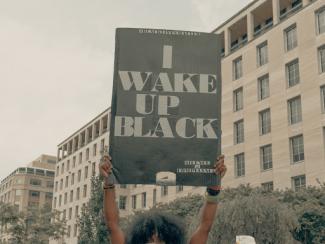
Florida Governor Ron DeSantis signed the “Stop WOKE” Act in 2022, intending to gut Black education from schools and workplaces. “The state of Florida is where woke goes to die,” he said. And this rhetoric spread nationwide.
But where did “woke” come from?
The concept’s at least a century old. In 1923, Marcus Garvey wrote, “Wake up Africa!” to urge the Black diaspora to be more aware of our social and political reality.
In 1938, Blues artist Huddie Ledbetter warned, “stay woke” in a protest song about the Scottsboro Boys.
The word continued circulating. And in 1962, Black novelist William Melvin Kelley published a piece in the Times called “If You’re Woke You Dig It.” Ironically, it was about white Americans co-opting innovative Black language. And that’s exactly what happened next.
From Erykah Badu in 2008 to social media users in 2017, #StayWoke connected millions of people commenting on the anti-Blackness of current events. Like, “You seeing this, too?”
White America soon swooped in, claiming “wokeism” as anything from cringy performative activism to a reason to criminalize anyone advocating for human rights. But do they really have the power to strip our culture of its meaning?
Nah. “Woke,” “conscious,” “radical,” you name it. Whether we reclaim our words or innovate new ones, our awareness hasn’t died yet. And it never will.